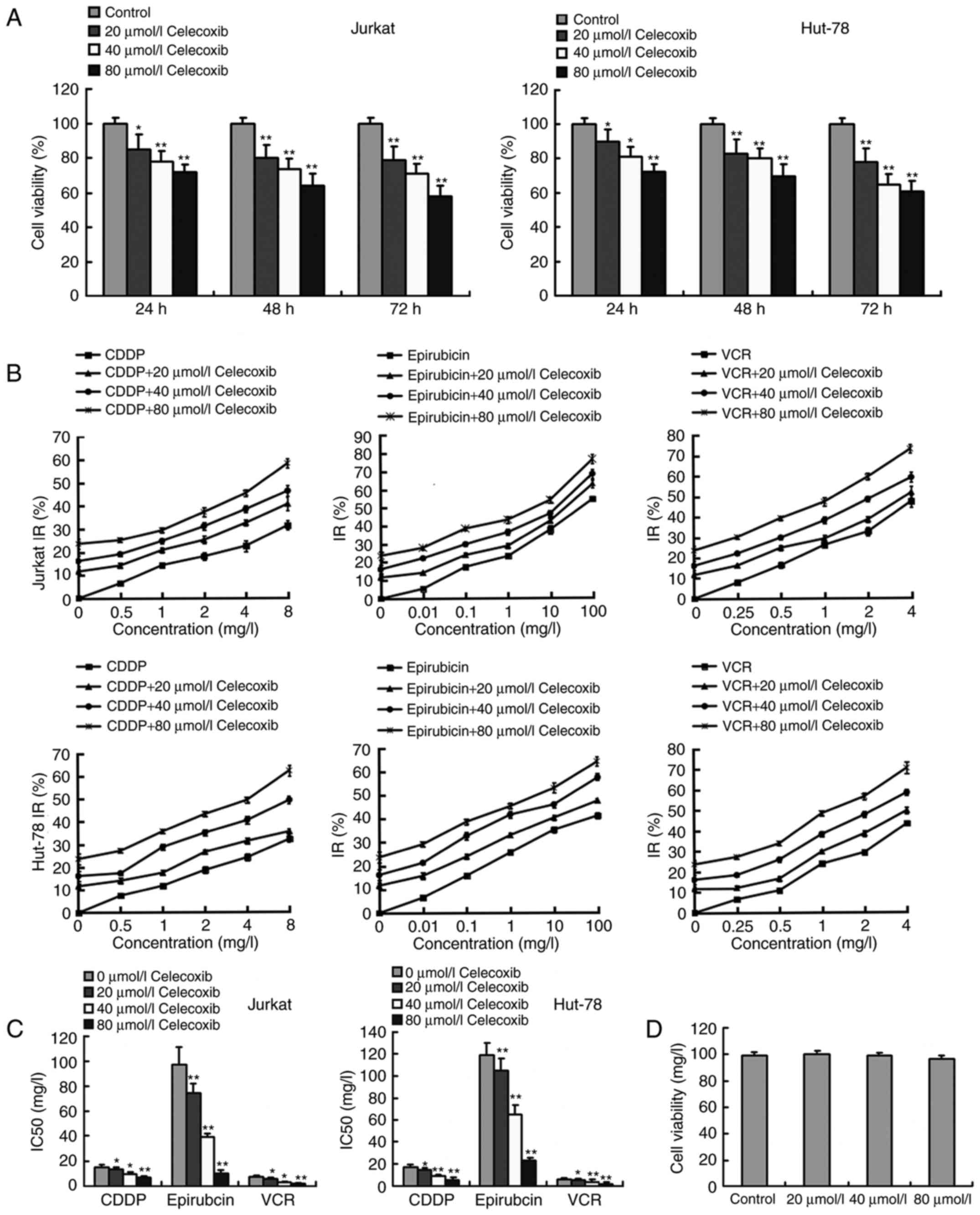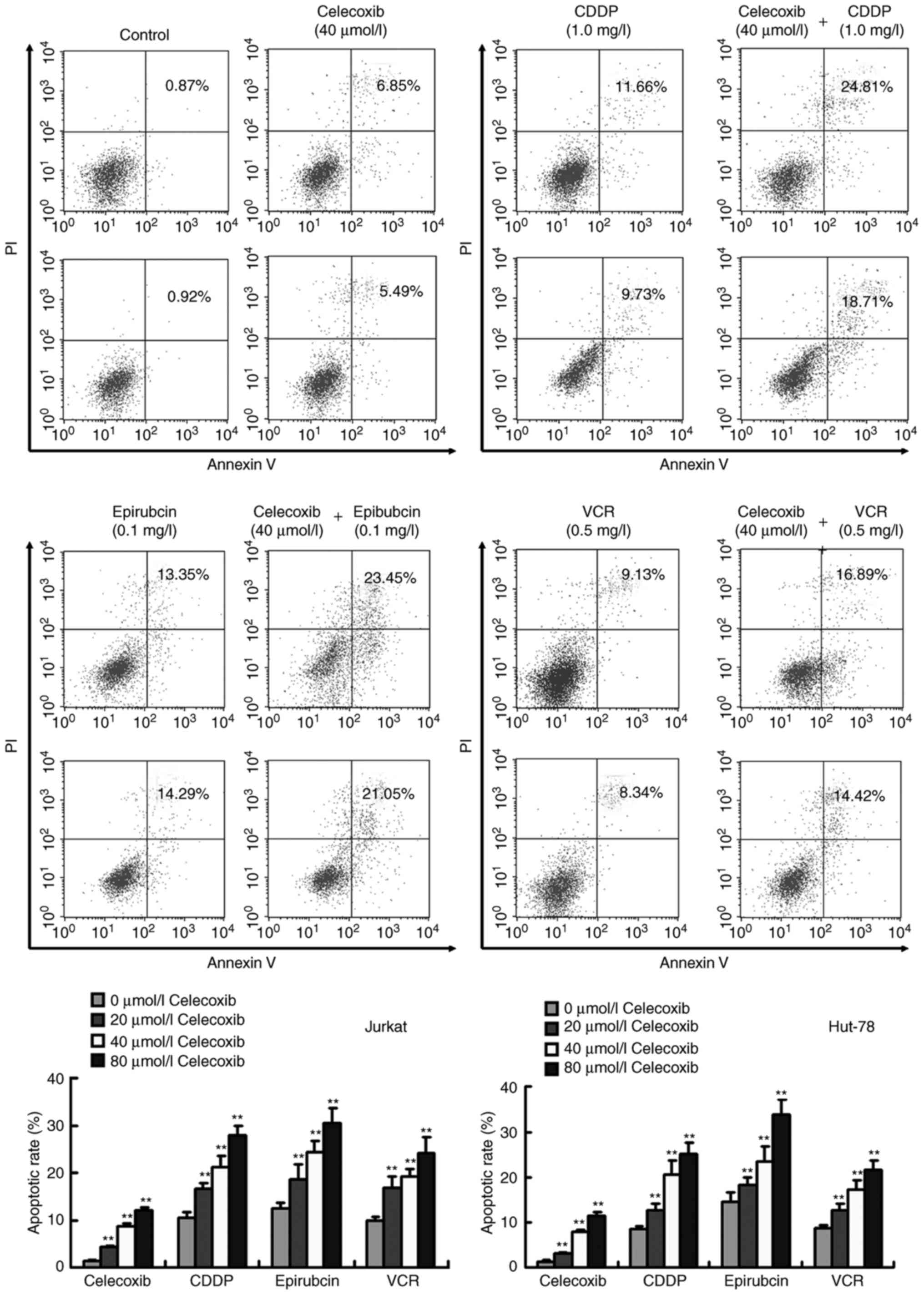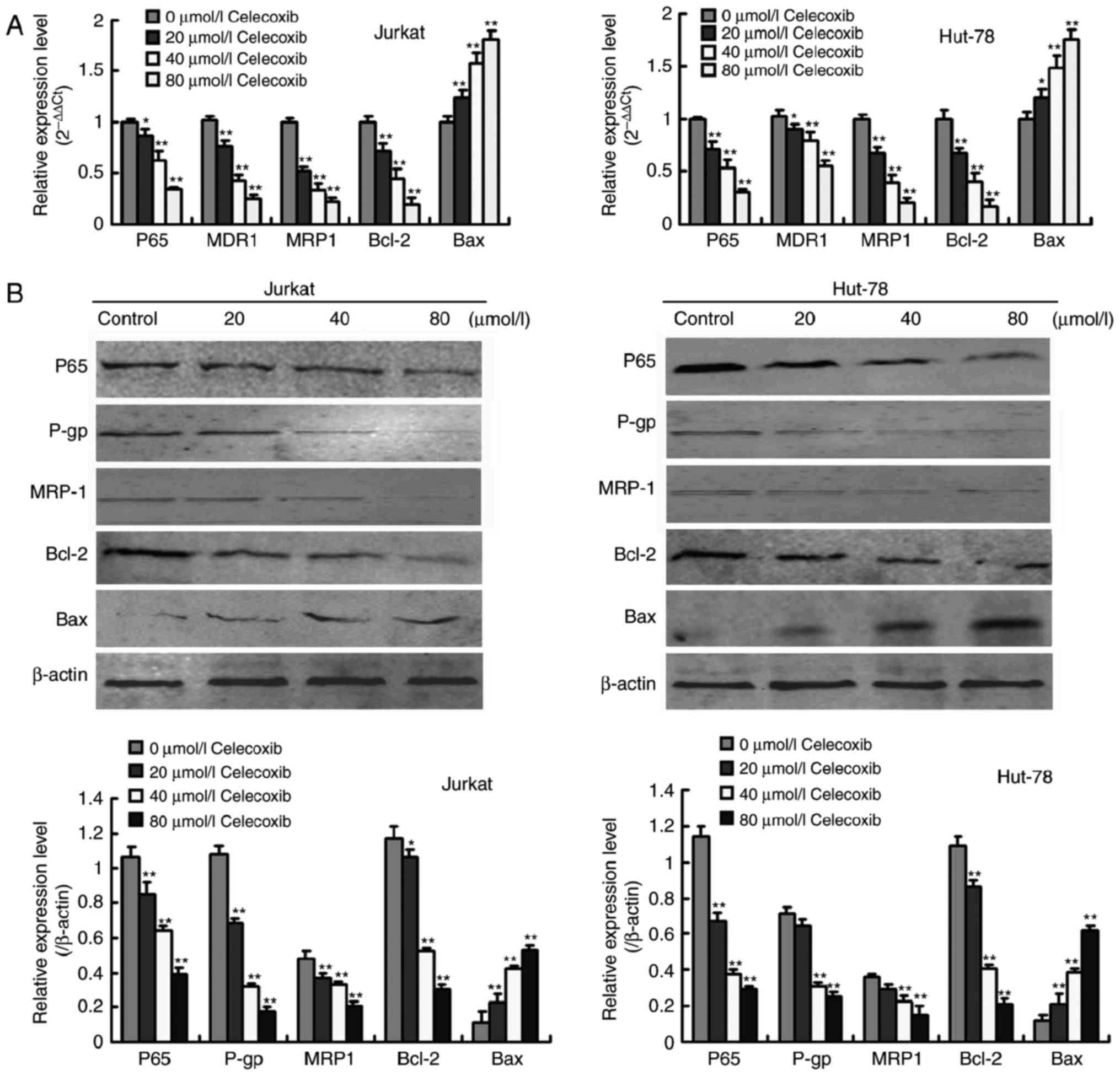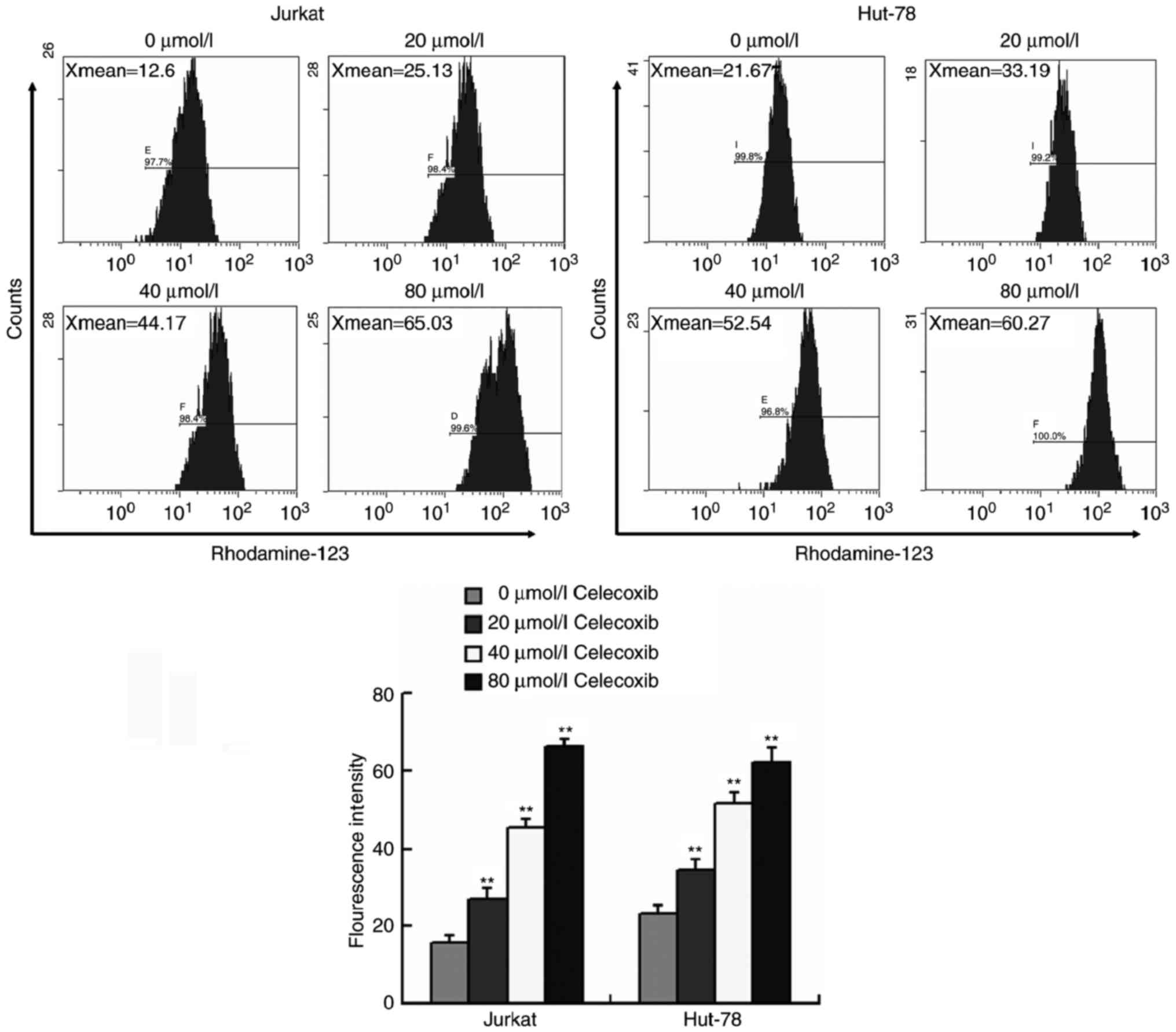|
1
|
Wang C, McKeithan TW, Gong Q, Zhang W,
Bouska A, Rosenwald A, Gascoyne RD, Wu X, Wang J, Muhammad Z, et
al: IDH2R172 mutations define a unique subgroup of patients with
angioimmunoblastic T-cell lymphoma. Blood. 126:1741–1752. 2015.
View Article : Google Scholar : PubMed/NCBI
|
|
2
|
Fang P, Zhang X, Gao Y, Ding CR, Cui F and
Jiao SC: Reversal effect of melanoma differentiation associated
gene-7/interleukin-24 on multidrug resistance in human
hepatocellular carcinoma cells. Anat Rec. 295:1639–1646. 2012.
View Article : Google Scholar
|
|
3
|
Futagami S, Suzuki K, Hiratsuka T, Shindo
T, Hamamoto T, Ueki N, Kusunoki M, Miyake K, Gudis K, Tsukui T and
Sakamoto C: Chemopreventive effect of celecoxib in gastric cancer.
Inflammopharmacology. 15:1–4. 2007. View Article : Google Scholar : PubMed/NCBI
|
|
4
|
Xu HB, Shen FM and Lv QZ: Celecoxib
enhanced the cytotoxic effect of cisplatin in chemo-resistant
gastric cancer xenograft mouse models through a
cyclooxygenase-2-dependent manner. Eur J Pharmacol. 776:1–8. 2016.
View Article : Google Scholar : PubMed/NCBI
|
|
5
|
Livak KJ and Schmittgen TD: Analysis of
relative gene expression data using real-time quantitative PCR and
the 2−ΔΔCT method. Methods. 25:402–408. 2001. View Article : Google Scholar : PubMed/NCBI
|
|
6
|
Yan ZX, Zheng Z, Xue W, Zhao MZ, Fei XC,
Wu LL, Huang LM, Leboeuf C, Janin A, Wang L, et al: MicroRNA181a is
overexpressed in T-cell leukemia/lymphoma and related to
chemoresistance. Biomed Res Int. 2015:1972412015. View Article : Google Scholar : PubMed/NCBI
|
|
7
|
Kuo MT, Liu Z, Wei Y, Lin-Lee YC, Tatebe
S, Mills GB and Unate H: Induction of human MDR1 gene expression by
2-acetylaminofluorene is mediated by effectors of the
phosphoinositide 3-kinase pathway that activate NF-kappaB
signaling. Oncogene. 21:1945–1954. 2002. View Article : Google Scholar : PubMed/NCBI
|
|
8
|
Wang L, Kang F, Li J, Zhang J and Shan B:
Overexpression of p65 attenuates celecoxib-induced cell death in
MDA-MB-231 human breast cancer cell line. Cancer Cell Int.
13:142013. View Article : Google Scholar : PubMed/NCBI
|
|
9
|
Wang L, Liu LH, Shan BE, Zhang C, Sang MX
and Li J: Celecoxib promotes apoptosis of breast cancer cell line
MDA-MB-231 through down-regulation of the NF-kappaB pathway. Ai
Zheng. 28:569–574. 2009.(In Chinese). PubMed/NCBI
|
|
10
|
Arunasree KM, Roy KR, Anilkumar K, Aparna
A, Reddy GV and Reddanna P: Imatinib-resistant K562 cells are more
sensitive to celecoxib, a selective COX-2 inhibitor: Role of COX-2
and MDR-1. Leuk Res. 32:855–864. 2008. View Article : Google Scholar : PubMed/NCBI
|
|
11
|
Liu Z, Duan ZJ, Chang JY, Zhang ZF, Chu R,
Li YL, Dai KH, Mo GQ and Chang QY: Sinomenine sensitizes
multidrug-resistant colon cancer cells (Caco-2) to doxorubicin by
downregulation of MDR-1 expression. PLoS One. 9:e985602014.
View Article : Google Scholar : PubMed/NCBI
|
|
12
|
Yan M and Nuriding H: Reversal effect of
vitamin D on different multidrug-resistanT cells. Genet Mol Res.
13:6239–6247. 2014. View Article : Google Scholar : PubMed/NCBI
|
|
13
|
Rauf A, Uddin G, Raza M, Ahmad B, Jehan N,
Siddiqui BS, Molnar J, Csonka A and Szabo D: Reversal of multidrug
resistance in mouse lymphoma cells by extracts and flavonoids from
pistacia integerrima. Asian Pac J Cancer Prev. 17:51–55. 2016.
View Article : Google Scholar : PubMed/NCBI
|
|
14
|
Lu D, Shi HC, Wang ZX, Gu XW and Zeng YJ:
Multidrug resistance-associated biomarkers PGP, GST-pi, Topo-II and
LRP as prognostic factors in primary ovarian carcinoma. Br J Biomed
Sci. 68:69–74. 2011. View Article : Google Scholar : PubMed/NCBI
|
|
15
|
Zhu WY, Huang YY, Liu XG, He JY, Chen DD,
Zeng F, Zhou JH and Zhang YK: Prognostic evaluation of CapG,
gelsolin, P-gp, GSTP1, and Topo-II proteins in non-small cell lung
cancer. Anat Rec. 295:208–214. 2012. View
Article : Google Scholar
|
|
16
|
Sakamoto A, Matsumaru T, Yamamura N,
Uchida Y, Tachikawa M, Ohtsuki S and Terasaki T: Quantitative
expression of human drug transporter proteins in lung tissues:
Analysis of regional, gender, and interindividual differences by
liquid chromatography-tandem mass spectrometry. J Pharm Sci.
102:3395–3406. 2013. View Article : Google Scholar : PubMed/NCBI
|
|
17
|
Yoshimori M, Takada H, Imadome K, Kurata
M, Yamamoto K, Koyama T, Shimizu N, Fujiwara S, Miura O and Arai A:
P-glycoprotein is expressed and causes resistance to chemotherapy
in EBV-positive T-cell lymphoproliferative diseases. Cancer Med.
4:1494–1504. 2015. View
Article : Google Scholar : PubMed/NCBI
|


















